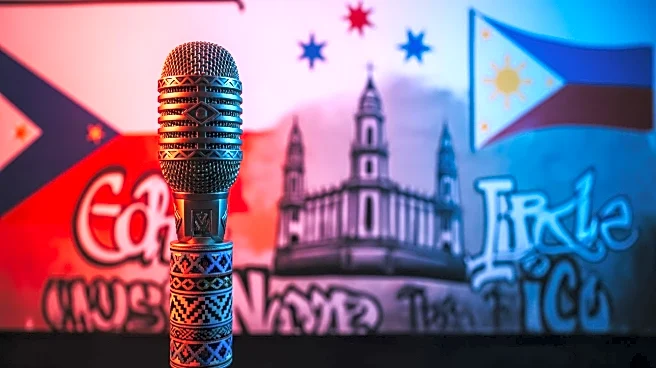What's Happening?
Filipino artists are increasingly using hip-hop as a platform to share their stories and experiences, particularly those related to immigration and cultural identity. Ruby Ibarra, a prominent figure in this
movement, recently performed at the Sakada to Cypher: Island Gongster Edition, showcasing her song 'Bakunawa,' inspired by Filipino mythology and her personal experiences. The event highlighted the growing presence of Filipino hip-hop artists in the U.S., who use their music to address social issues such as colorism and identity struggles. Ibarra's performance, alongside other artists like Jesand Amodo, emphasized the genre's roots in political activism and its role in giving voice to marginalized communities.
Why It's Important?
The rise of Filipino hip-hop artists in the U.S. signifies a broader cultural shift where marginalized communities are finding new ways to express their narratives and influence public discourse. This movement not only enriches the American music scene with diverse perspectives but also empowers Filipino Americans by providing a platform to address issues like immigration and cultural assimilation. As hip-hop continues to serve as a tool for political activism, it fosters a deeper understanding of the Filipino diaspora's challenges and contributions, potentially influencing public policy and societal attitudes towards immigrant communities.
What's Next?
The continued growth of Filipino hip-hop artists in the U.S. is likely to inspire more individuals from the community to share their stories through music. As artists like Ruby Ibarra and Jesand Amodo gain recognition, they may pave the way for increased representation and visibility of Filipino voices in mainstream media. This could lead to more collaborations and events that celebrate Filipino culture and address social issues, further integrating these narratives into the broader American cultural landscape.
Beyond the Headlines
The use of hip-hop by Filipino artists to tell their stories highlights the genre's potential to challenge traditional norms and promote cultural diversity. This movement may encourage other marginalized groups to utilize music as a form of expression and activism, fostering a more inclusive and representative cultural environment. Additionally, the emphasis on personal and community narratives could lead to a reevaluation of cultural identity and heritage among younger generations, promoting a sense of pride and belonging.









